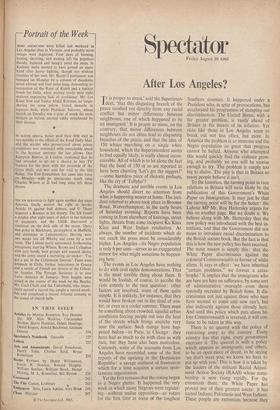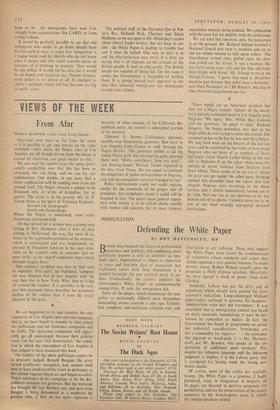After Los Angeles?
`T is proper to stress,' said the Superinten- I Tdent, 'that this disgusting breach of the peace resulted not directly from any racial conflict but minor differences between neighbours, one of which happened to be an immigrant.' It is proper to stress, on the contrary, that minor differences between neighbours do not often lead to disgusting breaches of the peace, and that the idea of 150 whites marching on a single white household, which the Superintendent seems to find equally likely, is really almost incon- ceivable. All of which is to let alone the fact that the band of 150 or so are reported to have been chanting 'Let's get the niggers ! ' --some harmless piece of rhetoric perhaps, like the cry of 'Tallyho'?
The dramatic and terrible events in Los Angeles should divert no attention from what is happening nearer at home. The inci- dent referred to above took place in Broome Road, Wolverhampton, in the early hours of Saturday morning. Reports have been coming in from elsewhere of knivings, street fights, threats from some incipient Ku Klux Klan and West Indian retaliation. As always, the number of incidents which do not reach the press must be considerably higher. Los Angeles—its Negro population is only 6 per cent—serves as an exaggerated mirror for what might sometime be happen- ing here.
The events in Los Angeles have nothing to do with civil rights demonstrations. That is the most terrible thing about them. It would be foolish, of course, to ascribe the riots entirely to the race question: other factors are involved, some of them quite simple. It is unlikely, for instance, that they would have broken out in the dead of win- ter, or even in a cooler summer. There must be something about crowded, squalid urban conditions forcing people out into the heat of the streets which brings anarchy very near the surface. Such risings have hap- pened before—in Paris, in Chicago : they have had as much to do with class as with race, but they have also been motiveless. Curiously, some of the accounts from Los Angeles have resembled some of the first reports of the uprising in the Dominican Republic: a savage outburst of frustration which for a time acquires a certain spon- taneous organisation. Yet the fact remains that the rioting began in a Negro ghetto. It happened the very week in which many Negroes were register- ing—without undue opposition—as voters for the first time in some of the toughest Southern counties. It happened under a President who, in spite of provocations, has accelerated his programme of stamping out discrimination. The United States, with a far greater problem, is vastly ahead of , Britain in the means of its solution. Yet riots like those in Los Angeles seem to break out not less often, but more. In America the problem is so immense and the Negro population so great that progress cannot be halted. Anyone who attempted this would quickly find, the violence grow- ing, and probably no one will be unwise enough to try. The problem is simply too big to shelve. The pity is that in Britain so many "people believe it isn't.
To the historian, the turning point in race relations in Britain will most likely be the publication of this Government's White Paper on Immigration. It may just be that the turning point will be for the better: the Labour MP Mr. Roy Hattersley argues for this on another page. But we doubt it. We believe along with Mr. Hattersley that the new policy was introduced with the best in- tentions, and that the Government did not mean to introduce racial discrimination to the British statute book. But the fact is that this is how the new policy has been received. The main reason is simply this : that the White Paper discriminates against the coloured Commonwealth in favour of white aliens. It says in effect : 'we have inherited "certain problems," we foresee a catas- trophe.' It implies that the immigrants who are here are here on sufferance, by some sort of administrative oversight—even those specially recruited by British firms. It dis- criminates not just against those who may have wanted to come and now can't, but also indirectly against those already here. And until this policy which puts aliens be- fore Commonwealth is reversed, it will con- tinue to be taken in this way. There is no quarrel with the policy of restricting entry to the country. Every country has that right, every .government exercises it. The quarrel is with a policy which appears to immigrants, and others, to be an open piece of deceit, to be saying `we don't want you; we know we have to put up with you.' This is how it is• taken by the leaders of the militant Racial Adjust- ment Action Society (RAAS) whose mem- bership is now rising rapidly. For the extremists there, the White Paper has proved one of their greatest assets : it has united Indians, Pakistanis and West Indians. These people are extremists because they
have to be: the immigrants have won little enough from organisations like CARD, or from voting Labour.
It would be perfectly possible to say that any. immigrant who wants to go home should have his fare paid at once, to argue that 'integration' is a vague word used by liberals who do not know what it means and who could scarcely quote an instance of it working in practice. That would be one policy. It would not be ours., but it would be an honest and practical one. Present Govern- ment policy is no policy at all. It attempts to shelve a problem which will fast become too big to easily solve.
The political staff of the Spectator live in Pot- ter's Bar, Holland Park, Chertsey and Much Hadham, so we are open to Mr. Hattersley's taunts about liberal leader-writers. But we keep to our line: the White Paper is leading to trouble fast and it must be halted. One way to start is to end the discrimination over entry. It is little use saying that it all depends on the attitude, of the British people. It does so only partly. The British people are capable of being led. On this issue it seems the Government is incapable of leading them. It is giving instead tacit approval to the idea that coloured immigrants are unwelcome second-class citizens.































 Previous page
Previous page